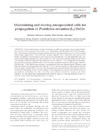Please use this identifier to cite or link to this item:
https://accedacris.ulpgc.es/jspui/handle/10553/105947
| Title: | Maintaining and storing encapsulated cells for propagation of Posidonia oceanica (L.) Delile | Authors: | Carrasco Acosta, Marina García Jiménez, M. Del Pilar |
UNESCO Clasification: | 251004 Botánica marina | Keywords: | Cell encapsulation Cryostorage Free cells In vitro propagation Salinity acclimation, et al |
Issue Date: | 2021 | Project: | Diseño E Implementación de Un Sistema de Monitorización Espacio -Temporal Eficiente de la Biodiversidad Marina Basado en la Aplicación de Metodologías Genéticas Sobre Muestras | Journal: | Aquatic Biology | Abstract: | In the present study, we have developed an efficient system for regenerating Posidonia oceanica via the storage of free cells at low temperature and the initiation of cell encapsulation. This system could help in solving problems related to the intractable nature of in vitro marine phanerogam regeneration. Free cells from enzyme digestion were preserved with glycerol and DMSO at different concentrations and stored at low temperature. Cell encapsulation was performed with sodium alginate and calcium chloride. First, results showed that optimum cell culture was obtained when the initial cell concentration was 104 cells ml−1. Cell scaling allowed exponential growth to produce 2 268 000 cells at 13 d. Second, treatment based on cell storage with 60% glycerol plus 1.3 M DMSO was a success. The preserved cells grew and produced 1.96 more cells than the initial cell concentration (104 cells ml−1). Third, the encapsulated cells (beads) showed a survival range of 84 to 100% over 4 yr. The divided beads released cells that developed embryos or free cells depending on the culture medium. Cell encapsulation was the only method that was successful to acclimatise the cells to salinity, store artificial material for sowing and obtain embryos. We concluded that encapsulated cells could be used as a starting material for the production of embryos in the regeneration of P. oceanica. | URI: | https://accedacris.ulpgc.es/handle/10553/105947 | ISSN: | 1864-7782 | DOI: | 10.3354/ab00740 | Source: | Aquatic Biology [ISSN 1864-7782], v. 30, p. 47-57, (Enero 2021) |
| Appears in Collections: | Artículos |
SCOPUSTM
Citations
2
checked on Jun 8, 2025
WEB OF SCIENCETM
Citations
2
checked on Jan 25, 2026
Page view(s)
309
checked on Jan 15, 2026
Download(s)
126
checked on Jan 15, 2026
Google ScholarTM
Check
Altmetric
Share
Export metadata
Items in accedaCRIS are protected by copyright, with all rights reserved, unless otherwise indicated.
